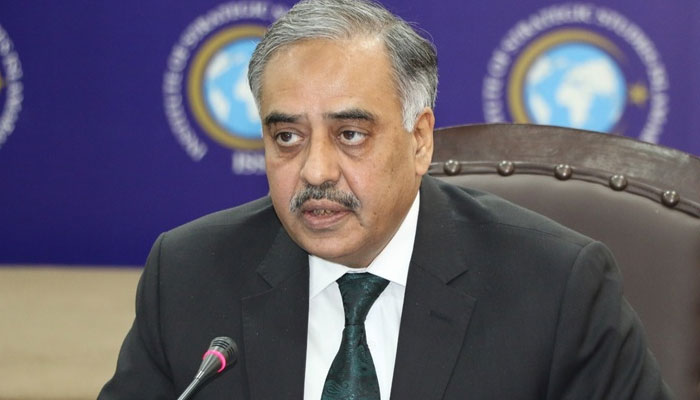Missile sanctions: Discriminatory US policies undermine regional strategic stability, say experts
Sohail Mahmood says US discriminatory policies accentuated military asymmetries in South Asia
ISLAMABAD: Former foreign secretary and Director General Institute of Strategic Studies Islamabad (ISSI) Sohail Mahmood has termed the recent US sanctions against Pakistani entities and the surprising statement by a senior NSA official about Pakistan’s long-range ballistic missiles as “unfortunate” and “unfounded, devoid of rationality and sense of history”.
While endorsing Foreign Office comments on the issue, Sohail Mahmood underlined that the US discriminatory policies accentuated military asymmetries in South Asia and undermined strategic stability in the region. “The Foreign Office had also affirmed that Pakistan’s strategic programme and capabilities were a ‘sacred trust’ of the people, it enjoyed complete consensus in the country, and was not subject to any outside intrusion or compromise.”
Ambassador Sohail Mahmood, who has been designated to be General Secretary of D-8, stressed the importance of constructively engaging the US to ensure that the US recognized Pakistan’s legitimate security concerns and legitimate defence needs; stress the imperative of fair, equal and non-discriminatory treatment; and effectively address the unfounded claim made by Jon Finer. He was confident that in the end, strategic clarity and national resolve would carry the day for Pakistan.
Malik Qasim Mustafa, Director of ACDC, ISSI, said that the US has ignored the fragile dynamics of strategic stability in South Asia by imposing these discriminatory sanctions. Pakistan has faced misperceptions about its strategic programme in the past and it has always sought to address international concerns while countering baseless allegations.
Ambassador Tahir Hussain Andrabi argued that the sanctions are a manifestation of geopolitical contestations. Further, it also showed the gaps in export control regimes where the legitimate needs of states to access technology for peaceful purposes are being blocked. He reaffirmed that Pakistan cannot accept caps on its missile capabilities. He reminded that arms control negotiations would be meaningful only in the bilateral context and the US should facilitate such a dialogue in our region. Dr. Zafar Nawaz Jaspal, Dean of Social Sciences and Professor at the School of Politics and International Relations, QAU, stated that sanctions are part of a political chessboard and represent a practical measure to discredit Pakistan. He stated that essentially the US was advocating that Pakistan must accept India as a major power in the region, which is not acceptable to Pakistan. The US intent with the sanctions is to cap Pakistan’s nuclear programme, and, if possible, to roll it back. He said that the US-China strategic competition, which was likely to intensify in the coming year, also plays a part in the political chessboard. India tried to cash in on the opportunities provided by geostrategic dynamics to put pressure on Pakistan. Ambassador Zamir Akram, Adviser to the SPD, noted that the strategic partnership between Pakistan and China may have been a factor in shaping the US policy. The pressure was also part of the strategy to contain China. He emphasized the need to further develop missile programme to counter the threat from India and underscored the need to develop a robust space programme. Participants unanimously resolved that Indian hegemony could not be accepted. They were also of the view that prospects of normalization of Pakistan’s relations with India seemed bleak. Ambassador Khalid Mahmood, Chairman Board of Governors ISSI, said that it’s not the first time sanctions were imposed and will not be the last. However, sanctions will not affect Pakistan’s strategic programme.
-
 Kate Middleton Proves She's True 'children's Princess' With THIS Move
Kate Middleton Proves She's True 'children's Princess' With THIS Move -
 Paul Anka Reveals How He Raised Son Ethan Differently From His Daughters
Paul Anka Reveals How He Raised Son Ethan Differently From His Daughters -
 'A Very Special Visitor' Meets Queen Camilla At Clarence House
'A Very Special Visitor' Meets Queen Camilla At Clarence House -
 Jodie Turner Smith Shares One Strict Rule She Follows As A Mom
Jodie Turner Smith Shares One Strict Rule She Follows As A Mom -
 Hailey Bieber Reveals KEY To Balancing Motherhood With Career
Hailey Bieber Reveals KEY To Balancing Motherhood With Career -
 Photo Of Jay-Z, Other Prominent Figures With Jeffrey Epstein Proven To Be Fake
Photo Of Jay-Z, Other Prominent Figures With Jeffrey Epstein Proven To Be Fake -
 Hillary Clinton's Munich Train Video Sparks Conspiracy Theories
Hillary Clinton's Munich Train Video Sparks Conspiracy Theories -
 Fans Slam Talk Show Host For 'cringe' Behavior In Chris Hemsworth Interview
Fans Slam Talk Show Host For 'cringe' Behavior In Chris Hemsworth Interview -
 Woman Jailed Over False 'crime In Space' Claim Against NASA Astronaut
Woman Jailed Over False 'crime In Space' Claim Against NASA Astronaut -
 James Van Der Beek’s Close Pal Reveals Family's Dire Need Of Donations
James Van Der Beek’s Close Pal Reveals Family's Dire Need Of Donations -
 Prince William And Harry's Cousins Attend 'Wuthering Heights' Event
Prince William And Harry's Cousins Attend 'Wuthering Heights' Event -
 Hailey Bieber Turns Heads Just Hours After Major Business Win
Hailey Bieber Turns Heads Just Hours After Major Business Win -
 King Charles' Andrew Decision Labelled 'long Overdue'
King Charles' Andrew Decision Labelled 'long Overdue' -
 Timothee Chalamet 'forever Indebted' To Fan Over Kind Gesture
Timothee Chalamet 'forever Indebted' To Fan Over Kind Gesture -
 Columbia University Sacks Staff Over Epstein Partner's ‘backdoor’ Admission
Columbia University Sacks Staff Over Epstein Partner's ‘backdoor’ Admission -
 Ozzy Osbourne's Family Struggles Behind Closed Doors
Ozzy Osbourne's Family Struggles Behind Closed Doors




